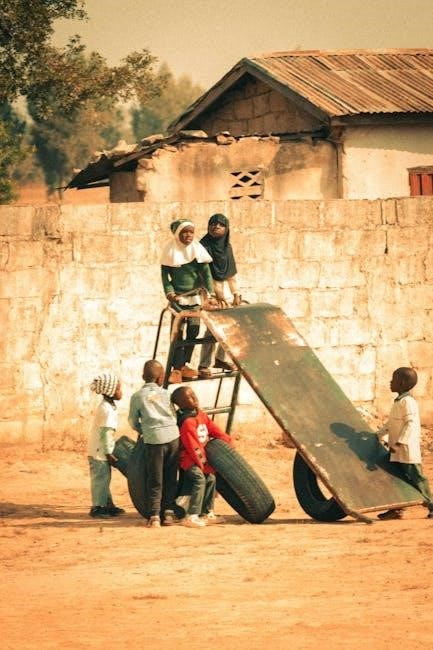Recent School Incidents in Nigeria
Recent incidents in Nigerian schools highlight growing safety concerns.
Kankara school attack left hundreds of students missing,
while a stampede in Ibadan claimed 35 lives,
shocking the nation and prompting urgent security measures.
1.1. Kankara School Attack: Gunmen Strike in Northwest Nigeria
Gunmen stormed a secondary school in Kankara, Northwest Nigeria, abducting hundreds of students. The attack, which occurred at night, left the community in shock. Many students remain missing, sparking widespread fear and calls for improved school security. Authorities are working to rescue the students, while the incident highlights the growing insecurity threatening Nigeria’s education system.
1.2. Ibadan Stampede: Tragedy at a School Fair
In Ibadan, a tragic stampede at a school fair claimed 35 lives and injured six.
Thousands of students attended the event in southwest Nigeria.
The incident shocked the community, raised safety concerns, and prompted urgent calls for improved security measures in schools to prevent future tragedies.

Educational Initiatives and Events
Nigeria witnesses transformative educational initiatives, including Transcorp’s recycling drive in Lagos and the Read to Lead campaign, fostering sustainability and child literacy nationwide.
2.1. Transcorp’s School Recycling Drive in Lagos
Transcorp’s School Recycling Drive in Lagos aims to promote sustainability and environmental education. The initiative encourages students to recycle waste, fostering eco-friendly habits. Schools participate in workshops and competitions to create innovative recycling solutions; This program not only educates students but also involves communities, reducing waste and promoting a greener future for Nigeria.
The drive distributes recycling bins and organizes clean-up events, engaging over 1,000 students. It collaborates with local authorities to ensure long-term impact, making it a model for other regions. This effort highlights the importance of collective action in addressing environmental challenges.
2.2. Read to Lead Campaign: Boosting Child Literacy
The Read to Lead campaign, launched by Foundations, focuses on improving literacy rates among Nigerian children. It provides free books, reading materials, and training for teachers to enhance learning outcomes. The initiative targets underserved communities, equipping children with essential reading skills and fostering a culture of education.
By engaging students through interactive reading sessions and technology, the campaign aims to bridge the literacy gap. It also encourages parental involvement, ensuring a holistic approach to education. This effort is critical in empowering future generations with the skills needed for success.
Examination and Admission Updates
JAMB extends Post-UTME deadlines, while WAEC and NECO release exam timetables. Federal universities adjust admission criteria, and state governments act on school placements.
3.1. JAMB and Post-UTME Latest News
JAMB extends Post-UTME registration deadline indefinitely, affecting thousands of candidates; Federal universities adjust admission criteria, while state governments announce new policies for school placements. Candidates are advised to monitor official portals for updates. The decision aims to accommodate late applications and ensure fairness in the admission process. Stay tuned for further announcements as the academic session progresses.
3.2. WAEC, NECO, and NABTEB Exam Updates
WAEC and NECO release results for recent exams, with improved pass rates reported. NECO extends registration deadlines for SSCE candidates, while NABTEB announces new exam policies. Candidates are urged to check official portals for updates and adhere to deadlines. Authorities emphasize strict measures to combat malpractice and ensure credible examinations. Stay informed for timely guidance and preparation.

Policy Reforms and Challenges in Education
Nigeria faces challenges like ASUU strikes disrupting tertiary education and rising out-of-school children. Reforms aim to increase funding and implement policies for better educational outcomes nationwide.
4.1. ASUU Strikes and Their Impact on Tertiary Education
Frequent ASUU strikes have disrupted tertiary education in Nigeria, causing prolonged university closures and delaying student graduations. These strikes, often over funding and working conditions, highlight systemic issues in the education sector.
The academic calendar is repeatedly affected, leaving students and parents frustrated. While ASUU demands better resources, slow government responses exacerbate tensions, underscoring the need for a sustainable solution to stabilize Nigeria’s tertiary education system.

4.2. Increasing Out-of-School Children in Nigeria
Nigeria faces a growing crisis of out-of-school children, with over 18.3 million currently not attending school. Poverty, insecurity, and cultural barriers are key factors. Experts warn this trend poses long-term socio-economic challenges, urging immediate action to address the issue.
Efforts to increase access to education are critical to reducing this number and ensuring a brighter future for Nigerian children.
Free Educational Resources and Scholarships
Nigerian universities and polytechnics offer free admission guides and scholarships. These resources help students access quality education, with benefits like tuition waivers and mentorship programs.
5.1. Nigerian Universities and Polytechnics Admission Guides
Nigerian universities and polytechnics provide free admission guides to help students navigate the application process. These guides include step-by-step instructions, eligibility criteria, required documents, and tips for success. They also offer information on financial aid and scholarship opportunities, ensuring aspiring students can access quality education with ease and clarity.
5.2. Scholarships and Study Opportunities in Nigeria
Nigeria offers various scholarships and study opportunities to students, fostering education and career growth. Initiatives like the Read to Lead campaign and Transcorp’s recycling drive promote literacy and sustainability. Additionally, programs such as the Federal University of Technology, Owerri’s extended Post-UTME registration highlight the country’s commitment to expanding access to quality education for all students.

Children’s Rights and Education
Nigeria faces challenges with 18.3 million out-of-school children, a ticking time bomb for future development. Experts warn of long-term economic and social repercussions without urgent reforms.

6.1. Children’s Day: Addressing the Plight of Nigerian Children
As Nigeria marks Children’s Day, concerns grow over 18.3 million out-of-school children, a crisis worsening due to poverty and insecurity. Experts warn of long-term socio-economic impacts, urging immediate action. Child abuse and neglect cases also rise, with 51% of adolescents facing exploitation. Policymakers are called to prioritize education funding and safeguard children’s rights to ensure a safer, educated future for Nigeria’s youth.
6.2. Combating Child Abuse in Nigerian Schools
Child abuse cases in Nigerian schools are rising, with 51% of adolescents facing exploitation.
Authorities are implementing stricter safety protocols and awareness campaigns to protect students.
Schools are urged to report suspicious activities, while policymakers push for stronger anti-abuse laws.
Community involvement is crucial to create a safer environment for children and ensure their rights are upheld effectively.
School Safety and Security Measures

Nigeria’s Safe School Initiative, launched in Benue State, emphasizes collaboration between police and communities to protect schools.
Security protocols are being strengthened nationwide to ensure student safety and prevent future incidents, fostering a secure learning environment for all.
7.1. Safe School Initiative in Benue State
The Inspector General of Police, IGP Kayode Egbetokun, launched the Safe School Initiative in Benue State to enhance security in schools.
The program emphasizes collaboration between schools, parents, and communities to create a safer environment.
Security measures include awareness campaigns, training for staff, and community vigilance to prevent threats.
This initiative aims to address rising security challenges and ensure a protected learning space for students.
7.2. Police and Community Collaboration for School Security
Police and community collaboration is vital for school security in Nigeria.
Neighborhood watch groups and joint patrols are being established to monitor schools.
Community members are trained to identify and report suspicious activities;
This partnership aims to create a safer environment, deter criminal activities, and ensure students’ well-being.
Such initiatives are crucial in addressing security challenges and fostering a culture of vigilance.

Academic Achievements and Celebrations
Nigeria celebrates academic excellence as Fudiyyah students graduate from Quran recitation ceremonies.
KWASU’s successful NUC re-accreditation highlights institutional achievements, fostering pride and national recognition.
8.1. Fudiyyah Students’ Quran Graduation Ceremony
Fudiyyah students recently celebrated their Quran graduation ceremony in Kano, marking a significant milestone in their religious education. Over 500 students successfully memorized the entire Quran, showcasing their dedication and achievements. The event, held on a grand scale, was attended by scholars, parents, and community leaders, highlighting the importance of Islamic education in Nigeria’s cultural and religious landscape.
8.2. KWASU’s NUC Re-accreditation Success
KWASU recently achieved a significant milestone with the successful re-accreditation by the National Universities Commission (NUC). This recognition underscores the university’s commitment to maintaining high academic standards and quality education. The re-accreditation covers key programs, ensuring students receive world-class training. This achievement reinforces KWASU’s reputation as a leading institution in Nigeria, fostering academic excellence and innovation for future generations.
School News and Updates
FUT Owerri extends Post-UTME registration indefinitely, while N-Power shortlists candidates for the next stage. Federal Ministry of Education focuses on improving access to quality education nationwide.
9.1. Latest Admissions and School Updates in Nigeria
FUT Owerri extends Post-UTME registration indefinitely, while N-Power shortlists candidates for the next stage. Universities and polytechnics nationwide release admission lists, with KWASU securing NUC re-accreditation. Transcorp’s recycling drive and Read to Lead campaign promote sustainability and literacy. Stay updated on the latest school admissions, event launches, and educational initiatives across Nigeria.
9.2. Federal Ministry of Education’s Mission and Goals
The Federal Ministry of Education aims to use education as a tool for fostering the development of all Nigerian citizens to their full potential. Its mission includes promoting a strong, democratic, and prosperous nation through equitable access to quality education. Key goals focus on improving literacy rates, enhancing teacher quality, and ensuring inclusive education for all, laying the foundation for a skilled workforce and future leaders.

Future of Education in Nigeria
The future of education in Nigeria focuses on increasing funding and leveraging technology to enhance learning outcomes and drive innovation across the sector.
10.1. Increasing Education Funding for Better Outcomes
Nigeria’s education sector requires significant funding to address challenges like infrastructure deficits and teacher shortages.
Experts advocate for increased allocation to education, ensuring resources reach schools and improve learning conditions, ultimately boosting academic performance and economic growth.
10.2. The Role of Technology in Nigerian Education
Technology is transforming Nigeria’s education sector by enhancing access to learning resources.
E-learning platforms and digital tools are bridging educational gaps, especially in remote areas.
Internet access and smart classrooms are enabling students to engage in virtual learning environments.
However, challenges like limited device availability and unstable connectivity hinder progress.
Government and private sector collaboration is crucial for scaling tech-based educational solutions nationwide.
